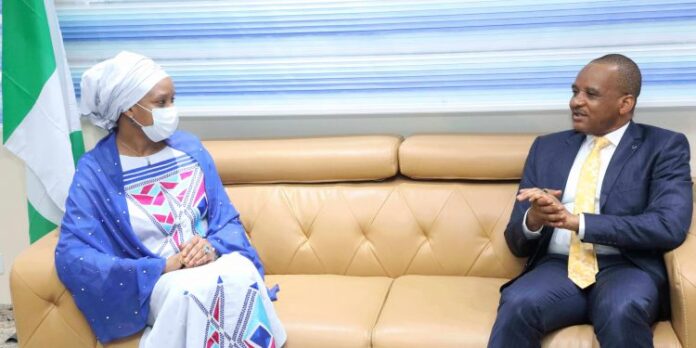By Chris Ndibe
The Federal Government has concluded arrangements to make the Integrated National Security and Waterways Protection Infrastructure, also called the Deep Blue Project, the central security structure for all anchorage areas in the Nigerian maritime domain.
Ms Hadiza Bala-Usman, the Managing Director of the Nigerian Ports Authority (NPA), made this known in Lagos and explained that the Deep Blue Project would reduce the cost of shipping of goods into the country.
Secure Anchorage Area (SAA) is a secure place where vessels can anchor safely from the threat of pirate attack.
Bala-Usman spoke after a meeting with the Executive Management of Nigerian Maritime Administration and Safety Agency (NIMASA) led by the Director-General, Dr Bashir Jamoh, at the Agency’s headquarters in Lagos.
The NPA managing director disclosed that both agencies had agreed to work out modalities for effective removal of all wrecks and derelicts that might hinder navigation in the Nigerian waters.
“NIMASA and NPA are sister agencies and should be seen to be collaborating more for the growth of the maritime industry and the country generally,’’ she said in a statement by Mr Philip Kyanet, Head, Corporate Communications, NIMASA.
She noted that arrangements were in top gear to berth the NIMASA floating Dockyard permanently for it to commence operations in July.
“We had a range of discussions bordering on the Secure Anchorage Area which our supervising ministry desires the Deep Blue Project to provide security for all anchorage areas in the country.
“Aside saving the country a lot of money, it will ensure that the security of the Nigerian maritime domain is given a focal attention,” Bala-Usman said.
She also noted that both agencies agreed to interlink the C3i of the NPA and C4i of NIMASA to interchange information that would assist the Nigerian Navy’s response to security.
“We have the C3i Command, Control and Intelligence Centre at NPA and NIMASA has the C4i while the Navy has falcon eye. We need to interlink these facilities and we believe that this will assist the country in response to maritime security threats,” she said.
Corroborating Hadiza’s stance, Jamoh reiterated the fact that there was need to harmonise most of the working models amongst all maritime agencies to avoid duplication of duties which also led to more costs.
Jamoh said the Secure Anchorage Area which had been a subject of debate amongst stakeholders would now be covered under the multi-spectrum security architecture popularly known as the Deep Blue Project.
“There is absolutely no need for us to have private security in our maritime space. You are aware that this increases the cost of shipping in our country.
“By the time the the Deep Blue Project becomes fully operational, the cost of shipping would drastically reduce,” he said.
The director-general also said that barring any unforeseen circumstances, the floating Dockyard should be operational by the end of July.
He added that the facility would employ hundreds of Nigerians directly and also earn huge amount in revenue for the country.
“We are finalising arrangements with the NPA to get a permanent berth for the floating Dockyard and by the end of July this facility should be operational.
“The interesting thing is that aside earning a huge amount of revenue, it also has the capacity to employ over 300 Nigerian youths directly,” Jamoh said.




